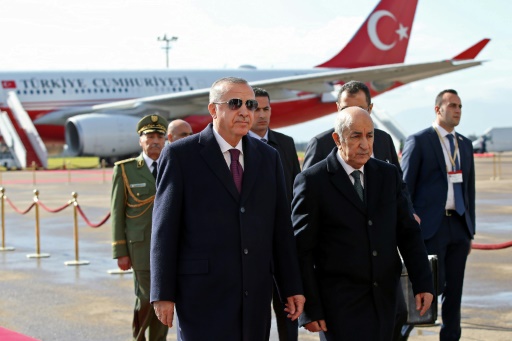
[ad_1]
Turkey is strengthening its influence in North Africa, analysts say, by intervening militarily in war-torn Libya and using “soft power”, trade and investment in Tunisia, Algeria and Morocco.
While Turkish-made drones won battles in Libya, its soap operas and other cultural merchandise captured the hearts and minds of Maghreb countries, many of which were once part of the Ottoman Empire.
Conservative Muslim President Recep Tayyip Erdogan has in recent years affirmed Ankara’s role as a regional actor, fighting with Greece and the European Union as well as with Russia and the Gulf countries.
His willingness to confront the former European colonial powers, particularly France, and to present himself as a defender of the Muslim world has earned him the respect of many in North Africa and elsewhere, observers say.
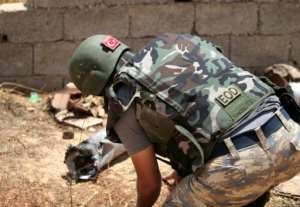 A Turkish deminer helps clear unexploded ordnance south of the Libyan capital Tripoli on June 15. By Mahmud TURKIE (AFP / File)
A Turkish deminer helps clear unexploded ordnance south of the Libyan capital Tripoli on June 15. By Mahmud TURKIE (AFP / File) Turkey’s growing influence in the Maghreb is the result of Erdogan’s “neo-Ottoman and pan-Islamic” foreign policy strategy, said historian Pierre Vermeren of the University of the Sorbonne.
“It really started in 2011 at the time of the Arab Spring,” when popular uprisings toppled autocrats in the region and Turkey supported Islamic movements such as the Muslim Brotherhood, he said.
“In 2020, there was a sudden acceleration of Turkish influence, which is now direct with its intervention in Libya, placing Turkish soldiers and mercenaries on the borders of Algeria and Tunisia.”
Ankara-backed networks promote Turkey “through social media and the press,” Vermeren said.
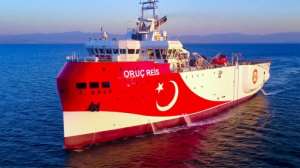 The Turkish seismic research vessel “Oruc Reis” explored gas fields in the Mediterranean Sea. By document (TURKISH DEFENSE MINISTRY / AFP / File)
The Turkish seismic research vessel “Oruc Reis” explored gas fields in the Mediterranean Sea. By document (TURKISH DEFENSE MINISTRY / AFP / File) Ankara-based political scientist Ali Bakeer acknowledged that “Turkey is seeking to strengthen its relations with the countries of the Maghreb region as part of its strategy of opening up to Africa.
“Turkish-Algerian relations are emerging rapidly. Meanwhile, the mutual interests between Turkey and Libya are evolving day by day. As for Tunisia and Morocco, Turkey is trying to focus on mutual economic benefits. “
Hard power in Libya
Turkey’s impact was most dramatic in oil-rich Libya, which was plunged into chaos following the overthrow of a NATO-backed uprising in 2011 that led to the murder of the longtime dictator Muammar Gaddafi.
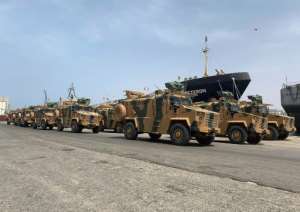 A Facebook page linked to the UN-recognized Libyan National Accord government shared a photo showing Turkish-made armored vehicles at the port of Tripoli. By – (Operation Volcano of Anger Media Office / AFP / File)
A Facebook page linked to the UN-recognized Libyan National Accord government shared a photo showing Turkish-made armored vehicles at the port of Tripoli. By – (Operation Volcano of Anger Media Office / AFP / File) Ankara’s aid with military advisers, materiel and mercenaries – echoing her interventions and her support for the defense of Syria to Azerbaijan – proved decisive this year when she rescued the national accord government recognized by the UN.
Turkey helped the Tripoli-based GNA repel an offensive by forces loyal to east-based strongman Khalifa Haftar, backed by Egypt, the United Arab Emirates and Russia.
It also helped Turkey on a separate issue, a competition with Greece and Cyprus for offshore gas fields, after Ankara signed an agreement with the GNA claiming vast maritime territories.
Emadeddin Badi, analyst at the Global Initiative Network, said that “Turkey is trying … to use its military investment to influence”.
Its military footprint is now significant in Libya, a country seeking permanent peace after a UN-brokered ceasefire.
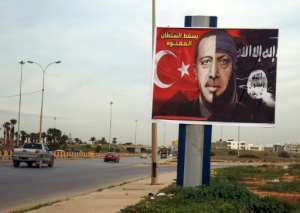 A billboard defaming Turkish President Recep Tayyip Erdogan as a member of the Islamic State group in the port city of Benghazi in eastern Libya. By Abdullah DOMA (AFP / File)
A billboard defaming Turkish President Recep Tayyip Erdogan as a member of the Islamic State group in the port city of Benghazi in eastern Libya. By Abdullah DOMA (AFP / File) “Turkey has the largest military base on the Tunisian border, a naval base (and) camps populated by Syrian mercenaries,” said Jalel Harchaoui of the Clingendael Institute in The Hague.
The Turkish parliament on Tuesday authorized an 18-month extension of the deployment of its troops in Libya.
Vermeren said that “in Libya, Turkey has made itself essential, through” hard power “.
“In the rest of the Maghreb, it may be ‘soft power’ – but with great economic artillery all the same.”
Tunisia, Algeria, Morocco
In the countries west of Libya, Turkey has focused on trade and investment.
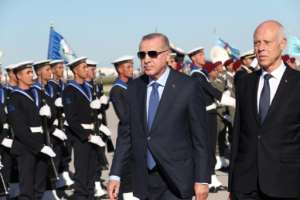 Turkish President Recep Tayyip Erdogan visited Tunisia in December 2019 and met his Tunisian counterpart Kais Saied. By – (TURKISH PRESIDENTIAL PRESS SERVICE / AFP / Dossier)
Turkish President Recep Tayyip Erdogan visited Tunisia in December 2019 and met his Tunisian counterpart Kais Saied. By – (TURKISH PRESIDENTIAL PRESS SERVICE / AFP / Dossier) More than 1,200 Turkish companies have moved to Algeria, a country Erdogan visited earlier this year and also helped with Covid-19 medical supplies.
Turkey has become the third-largest importer of Algerian products, and the two countries aim to increase trade to 4.1 billion euros ($ 5 billion) per year.
In another area, Turkey has contributed in recent years to the restoration of the Ottoman-era Ketchaoua mosque in Algiers.
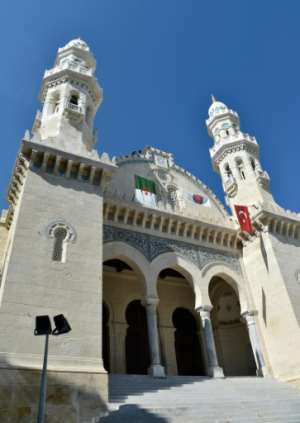 The Ketchaoua Mosque in the famous Casbah district, a UNESCO World Heritage Site, in Algiers, as workers complete the final stages of its renovation on October 15, 2017. By RYAD KRAMDI (RYAD KRAMDI / AFP / File)
The Ketchaoua Mosque in the famous Casbah district, a UNESCO World Heritage Site, in Algiers, as workers complete the final stages of its renovation on October 15, 2017. By RYAD KRAMDI (RYAD KRAMDI / AFP / File) Turkish imports into the Maghreb region have increased sharply, in particular “Made in Turkey” textiles which crowd out locally produced products.
“The Turks have flooded the textile market and killed many Moroccan brands,” said a manufacturer in the kingdom, who revised a 2006 free trade agreement in October.
In Tunisia, businesses have also been affected by low-priced Turkish products which have increased since a 2004 free trade agreement, and Tunis reinstated some import duties in 2018.
There is, however, another source of appeal for many in the region – Erdogan himself, who has supported the Muslim Brotherhood despite being labeled a “terrorist organization” by Egypt and several other countries. Arabs.
Amid the growing youth population in North Africa, grappling with soaring unemployment made worse by the pandemic, Erdogan has earned wide respect, Vermeeren said.
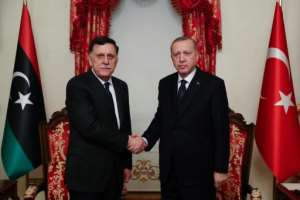 Turkish President Recep Tayyip Erdogan presented himself on February 20 with Libyan National Accord (GNA) head of government Fayez al-Sarraj in Istanbul. By – (TURKISH PRESIDENTIAL PRESS SERVICE / AFP / Dossier)
Turkish President Recep Tayyip Erdogan presented himself on February 20 with Libyan National Accord (GNA) head of government Fayez al-Sarraj in Istanbul. By – (TURKISH PRESIDENTIAL PRESS SERVICE / AFP / Dossier) The Turkish head of state borrows from a tradition dating back to Gamal Abdel Nasser in Egypt as “another Mediterranean leader who insults Europe and presents himself as a defender of Muslims,” the historian said.
Harchaoui agreed that the approach appealed to many young North Africans, believing that “a whole section of the youth sees in the Turkish example a model of independence”.
strawberries-hme / pjm / fz / wai
Source link